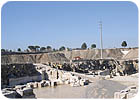
Estraba's quarries, which are located in the historic region of Barco near Tivoli, Italy, span over an area of approximately 2.7 million square feet. The company is part of Industrie Caucci - a group that has been quarrying Roman travertine since 1939.

Estraba, which specializes in the production of tiles and cut-to-size pieces, ships its travertine to projects worldwide.
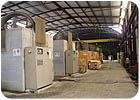
The plant is equipped with a line-up of gangsaws for processing travertine blocks.

Once blocks are cut, about 60% of the material is exported to foreign markets.
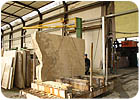
Large pieces of travertine are handled with care by factory workers, and put in place to be cut into tiles, slabs and cut-to-size pieces.
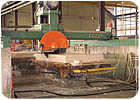
Among the equipment in the plant are several Pedrini bridge saws.
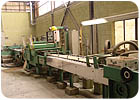
The operation also includes a Pedrini tile line.
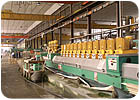
A Levibreton slab polishing line from Breton is equipped with Tenax abrasives.
- sawn
- filled and honed
- filled, honed and polished
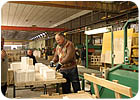
At the time of Stone World's visit, travertine tiles were being packaged and crated for a job in Tokyo, Japan.
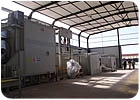
A recent purchase for Estraba was a Breton automatic resin-application plant.